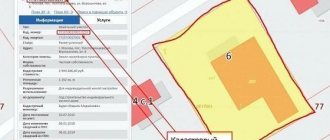Ownership and other documents
You can make sure that the seller has ownership of the apartment and it is legally registered thanks to:
- agreement of purchase and sale, rent, exchange;
- deed of gift or certificate of inheritance;
- privatization certificate;
- a court decision recognizing the right of ownership.
The seller must have one of the specified papers along with a document confirming the owner’s right to real estate - a certificate of ownership of the apartment, and from January 1, 2017 - an extract from the Unified State Register of Real Estate. Along with the specified documents, the seller must provide:
- passport, as well as a second identification document (for example, a driver’s license);
- certificate of ownership or extract from the Unified State Register of Real Estate;
- an extended extract from the Unified State Register of Real Estate (contains data for the last 20 years, the document is issued by Rosreestr or MFC, can be ordered remotely);
- cadastral passport;
- an extract from the house register;
- technical plan of the apartment.
Request original documents, since they need to be checked for signatures and seals of government agencies. You can entrust the inspection of real estate before purchase to specialists - realtors and lawyers, or you can do it yourself.
Is it necessary to privatize the purchased apartment?
Yes, the purchased apartment must be privatized. The main advantage of a privatized apartment, room or share is that it becomes property (what a sample purchase and sale agreement for a share in an apartment between relatives looks like and what documents are needed, read here). As you know, the owner has the right to dispose of his property at his discretion - he can sell it, change it, donate it or bequeath it at his discretion.
It is worth remembering that only privatized housing . If a single owner of a non-privatized apartment dies, then no laws on inheritance of relatives of different lines apply. In this case, the apartment becomes the property of the state .
One of the advantages of privatized housing is that it can act as collateral for a large bank loan. But in this case, it is worth remembering that this fact will be a burden until full payment is made if the apartment is put up for sale. Of course, you can sell it, but not every buyer agrees to take responsibility for paying off other people's bank debts.
In a privatized apartment, the owner has the right to register any persons at his own discretion , without coordinating this issue with representatives of local authorities.
The owner of the property can also, at his own discretion and without additional approval from regulatory authorities, rent out the apartment.
At the same time, he is obliged to pay a tax of 13% to the state on the profit received.
The tax is calculated based on the amount specified in the rental agreement.
According to the real estate tax law that came into force in 2014, home owners are required to pay tax based on its value.
Apartment owners also pay for major repairs of the buildings in which their apartments are located. Before privatization, this expense item was the responsibility of city and municipal authorities. For families with a minimum income, such expenses may become too high.
Checking a home before purchasing: presence of third parties
An important point is to check the apartment for possible rights to it of third parties. You need to be especially careful if the seller inherited the property. Check to see if the rights of other heirs have been infringed. It is important to make sure that the apartment was legally privatized. Ideally, if the seller acquired ownership more than three years ago. In this case, the likelihood that the transaction could be challenged is almost non-existent.
An important point in checking a home before purchasing is the people registered in the apartment, who, as you understand, have the right to live in the premises even after the owner changes. The seller must deregister all occupants before selling the premises. If someone is registered at the time of the inspection, make sure that you will not have problems with eviction. There are categories of citizens who can declare their right to live in real estate. These include: those undergoing military service, convicts, minors living in educational institutions, pensioners living in nursing homes.
Checking real estate before purchasing also involves being aware of the absence of encumbrances on the property (information is contained in the extract from the Unified State Register of Real Estate). Housing should not be subject to mortgage, seizure, lease or rent. Otherwise, the transaction may not be registered.
Is it necessary to privatize an apartment?
The purchased apartment must be privatized at will ; it can also be left in the ownership of the municipality.
The Russian government regularly postpones the end of privatization, and recently a law has been considered to make it indefinite.
Therefore, if citizens are in line to improve their housing conditions, or for some other reason they are using a social rental agreement and are not privatizing their housing, then there is no point in rushing yet.
Non-privatized housing can also participate in sales transactions - it can be exchanged for a larger or smaller area with an appropriate surcharge. Only in this case will an exchange agreement be concluded, since only property can be sold.
What else should you pay attention to?
- check the information about the apartment yourself on the official website of Rosreestr - data from the Unified State Register can be ordered by any person (the extended extract contains data on changes of owners, conclusion of transactions, encumbrances);
- no debt for housing and communal services - ask the seller to provide a document confirming the absence of debt for the last year from the management company and the last paid receipt. Unless, of course, you want to pay for services that were not provided to you;
- consent of the spouse – if the seller is married, when selling real estate he must provide documentary consent (drawn up by a notary) to the spouse’s transaction;
- If you are buying an apartment in an apartment building, it is worth checking whether the high-rise building is in danger of being demolished or whether it is in disrepair.
Additional
Additionally, the following documents can be used, which the buyer needs to keep with him in case of force majeure. These are the following documents:
- If the seller is legally married in which the apartment was purchased, according to the provisions of Article 35 of the RF IC, he is obliged to convey the consent of the spouse to the transaction (for details about what documents should be required from the seller when purchasing an apartment, read here).
- The same applies if the spouses divorced less than 3 years ago and there was no division of property.
- A court decision on the division of property in the event of a divorce between the seller and her spouse.
- If the seller was a minor, permission from the guardianship and trusteeship authorities to sell the property.
- The seller's heir transfers the waiver of the right to the apartment from other co-heirs (according to their number).
- Co-owners of shared ownership agree to the transaction, renouncing the pre-emptive right to purchase.
IMPORTANT: Some papers must remain with the seller; they are not handed over; the buyer can make a notarized copy of them.
Seller reliability
In addition to checking the home before purchasing, you should also make sure that the seller himself is reliable. The best way to verify a person’s identity, as well as that everything is in order with his mental health, is to ask him to show his license along with his passport.
So, when choosing housing, the following facts should alert you: real estate often changed owners on the basis of a purchase and sale agreement; registered people remain in housing; The premises are offered at too low a price (they want to sell it quickly).
Checking a home before purchasing for legal purity with the involvement of professionals may require costs, but will save you, at best, from litigation, and at worst, from the loss of real estate and money.
TOP 10 reasons to refuse to buy an apartment
Choosing an apartment without certain, at least basic, knowledge about the problems that may arise is fraught with losing money or buying an unsuitable option for living.
Based on the experience of lawyers and realtors who have taken part in concluding many apartment transactions, we can make a list of the most important factors that require increased attention when purchasing a home. This is especially true for the secondary real estate market.
- Unauthorized redevelopment
You may like the apartment precisely because of its layout. At the same time, it is very important to check the serviceability of all documents and their registration with government agencies responsible for redevelopment of residential premises. It is necessary to personally verify that the existing apartment plan corresponds to the one valid at the time of purchase.
If you miss the details, then problems may arise, both with the legalization of the redevelopment, and with additional waste of time and money to resolve all issues. In the worst case, you will have to demolish everything and return the original version.
- Apartment in a “bad” area
Factors in a bad area or place of purchase may include:
- increased level of crime;
- poor infrastructure;
- presence of industrial enterprises in the district;
- close proximity to busy highways;
- bad ecology.
It is necessary to think about the requirements for future housing and conduct research. Invaluable information can be obtained from future neighbors or area residents, as well as from local online forums and chat rooms. It must be remembered that the problem may not be noticed at first glance.
- The owner of the apartment received it as an inheritance or as a gift
Purchasing such real estate is dangerous because other potential heirs may lay claim to it. It is imperative to check exactly when the heir took over the rights or when the gift agreement was signed.
If the dates are recent, then it can be highly likely that there are elements of unfair sales. The sale and purchase agreement itself will be legal, but then litigation may begin with possible heirs.
- One of the homeowners did not participate in the privatization of the property
This scheme is not new and many buyers have been burned by it. You must understand that even after the square meters are legally registered in the name of the new owner and he takes full ownership rights registered in the apartment (at the time of privatization), the residents have a lifelong right to live at this address.
It is worth paying attention to the date of privatization - if it took place recently, then there is a danger of fraud, and they are in a hurry with the sale in order to have time to complete the documents and receive the money before hidden circumstances emerge.
- Multiple transfers of ownership
This is a reason to worry, because long chains of transferring rights to property ownership greatly increase the likelihood that at some stage there could be a problem with documents or, for example, inheritance rights were violated.
In such cases, you will have to check the entire series of transfers of ownership rights in Rosreestr and study the history of all sales, donations, etc. Even one incorrect transaction in the chain can lead to the cancellation of subsequent ones. Courts in such cases take a very long time.
- Real estate was purchased with maternity capital
In this case, you definitely need to refuse the purchase, because the shares of minor children will most likely remain in question, because maternity capital must be used strictly for its intended purpose.
You can check whether the maternity capital has been used correctly and whether the children’s shares have been allocated by ordering an extract from the Pension Fund of the Russian Federation.
- The price of the apartment is too low
One of the most accurate signs that deception is taking place. If the price is greatly underestimated, then they are trying to sell the apartment even to their own detriment. It is necessary to clarify why they want to urgently get rid of real estate. Many people underestimate the cost on paper, trying to officially enter a smaller amount in order to avoid paying significant taxes.
It must be remembered that if for some reason the transaction is declared invalid by the court, then only the funds officially included in the sale document will be returned.
- The apartment is in “deplorable” condition
So-called “destroyed” apartments that require large investments in repairs are not worth buying, because the discount on them is unlikely to pay off after renovation and restoration to a normal residential appearance. In particular, such apartments are then difficult to sell at a price that takes into account all investments.
Separately, realtors advise not to buy housing after flooding, fires and other unusual situations, because such properties, as a rule, have many problems that are not visible to the naked eye (odors, mold, cracks).
- An apartment in a building that is in line for renovation or demolition
Before purchasing, it is necessary to check the district and city plans that involve the demolition or resettlement of the house. The relocation will most likely not take into account the factors that led the property buyer to choose that particular building location, floor, area, etc.
- The owner of the property is registered at a psychiatric clinic
Without checking this circumstance, the buyer risks getting into a situation where the purchase and sale transaction is canceled due to the incapacity of the seller. Proving you are right in court and getting your money back is usually very difficult, and sometimes impossible. As a rule, the patient’s relatives also participate in such a deceptive scheme, deliberately not reporting the real state of affairs.
An experienced realtor is well acquainted with all of these fraudulent schemes, but potential apartment buyers often skimp on quality services and try to figure it out themselves. In this case, we must not forget that you may end up with nothing.
The concept of deprivatization
Deprivatization is the reverse process of privatization. Citizens who received an apartment owned by the municipality free of charge can transfer it back to the state. At the same time, residents retain the right to live in the apartment indefinitely.
The procedure is judicial and administrative.
The legislator does not provide the concept of deprivatization. But it is generally accepted that invalidation of a privatization agreement in court is deprivatization, and the voluntary return of housing is correctly called deprivatization.
But since the meaning of both procedures is the same, we will not go into linguistic subtleties and call the process deprivatization.
The reasons why apartment owners want to voluntarily deprive themselves of their property rights are difficult to imagine. But, nevertheless, there are situations when deprivatization turns out to be a profitable solution. Here are examples of circumstances that force citizens to renounce their property rights:
- Opportunity to get on the waiting list for housing in connection with the program for relocation from dilapidated and emergency housing. According to the law, owners of apartments in such buildings are entitled to compensation equal to the market value of the premises. And tenants have the right to get an apartment of the same size in a normal building. The market value of the apartment in the second case will exceed the material compensation that the owner of the property can receive from dilapidated and emergency funds. Therefore, residents decide to give up their property in favor of ownership under a social tenancy agreement. Subsequently, the children of residents will be able to privatize the apartment provided to replace the emergency one. Even if there is no one to privatize the housing, the owners will have the opportunity to live indefinitely in a municipal apartment of a suitable size.
- The use of other social programs, the condition for participation in which is the lack of own real estate, or the lack of square meters per family member.
- Interest in some material gain. Thus, tenants are exempt from paying property taxes and contributions for major repairs. For example, a citizen has no relatives and has no one to bequeath his housing to. The absence of the need to pay contributions for major repairs will relieve the pensioner of a certain expense item.
Status of a privatized apartment
Typically, privatized housing, unlike a non-privatized apartment, is the property of the person or group of persons who participated in the procedure, and not the state.
If one person owns such housing, then it is considered personal property and no problems should arise during the sale. But if privatization was carried out for several persons, then the buyer should be wary.
People who live entirely in this housing rarely think about the need to privatize a non-privatized apartment. As a general rule, persons registered in an apartment subject to privatization have a lifelong right of residence. Not many people think about whether it is necessary to privatize an apartment. So the need for privatization arises only when the persons living in the apartment wish to sell it or otherwise transfer it to third parties.
Otherwise, after the death of the person registered in the dwelling, it will go to the use of the remaining residents or back to the jurisdiction of the authorized state body.
By privatizing housing, individuals can count on expanded powers, including sales. Thus, this procedure is optional and is carried out exclusively on a voluntary basis.
Conclusions about buying an apartment, privatization
Buying an apartment is a very responsible matter , which contains many nuances and pitfalls. There is a single scheme for purchasing a home, but each individual case is completely individual.
For each specific transaction, certain documents or procedures may be required that are not indicated in the list. For example, if the seller is a very elderly person, then medical certificates alone will not be enough. Sometimes it may be necessary to have a doctor present at the transaction, who will document the seller’s legal capacity at the time of the transaction.
This is necessary, first of all, for buyers, so that later the heirs or relatives of the seller do not have the opportunity to challenge the concluded transaction.
And in order to protect yourself as much as possible when buying an apartment, you should seek help from specialists - lawyers or realtors who deal with real estate issues professionally.
Buyer's risks
The buyer needs to consider the risks when buying an apartment. The main risk for the buyer when purchasing a privatized apartment is the recognition of the transaction as invalid. This is carried out only in court, so in addition to refusing the transaction, the buyer will have to lose time and money in court.
Basically, the invalidity of the transaction under which a privatized apartment is sold may be as follows:
- sale of housing by an unauthorized person;
- lack of consent of co-owners;
- the presence of another agreement under which the housing is transferred to another person;
- failure to respect the interests of minors and incapacitated persons;
- the presence of encumbrances on privatized housing.
As a general rule, it is rare that creditors agree to accept privatized housing as collateral. However, the buyer should not exclude this option.
Thus, before purchasing a privatized apartment, it is best to consult with specialists. Due to the development of the real estate market, today realtors in their respective regions have complete information about real estate properties whose owners have decided to sell them. Of course, their services are not cheap, but it will save a lot of time and eliminate unwanted risks
Privatization of the purchased apartment
If citizens have purchased a non-privatized apartment, they can register it as their property on the basis of a social tenancy agreement, which will be concluded with local authorities after the acquisition.
Any family members registered in the apartment on the basis of a social tenancy agreement and who have not previously participated in privatization can participate in the privatization of a new apartment.
The privatization process in this case is no different from the usual standard procedure. A standard package of documents is also required. Owners may be refused privatization due to large debts for utilities and housing and communal services. Therefore, you should not accumulate unsustainable debts, otherwise it will simply not be possible to privatize the apartment.
If an apartment is purchased with a large existing debt (this is also possible), then the new owners planning to privatize it after the purchase should take this fact into account when purchasing.
Choosing an apartment
When choosing an object for a future transaction, you should carefully examine it. This will avoid unexpected problems with illegal redevelopment, wiring and neighbors after purchase.
Yaroslav Petryk, senior lawyer at the Padva & Epstein law office: It is necessary to obtain information about the technical condition of the residential building and the apartment itself (year of construction, materials and condition of structures and ceilings, utility networks, electrical wiring, sanitary condition of the entrance and surrounding area, social status neighbors).
During the inspection, it is important to check the actual layout of the apartment with the documents of the Technical Inventory Bureau (BTI) for it (explication or technical passport). The seller can provide such documents for comparison. The fact is that Russian housing legislation requires coordination with local governments of almost any reconstruction and redevelopment of residential premises. And carrying out redevelopment without the approval provided by law is an administrative offense, which is punishable by a significant fine.
Verifying the seller's credentials
After checking the history of transactions with an apartment, you should eliminate the risk of paying money to a person who is not its owner, and therefore does not have the right to sell it.
Yaroslav Petryk: Attackers can use an invalid or lost passport when selling an apartment. To check the validity of a passport, the Federal Migration Service of the Russian Federation (FMS) has created a specialized service on the official website. However, the information on it is for reference only. Official information can be obtained by contacting the FMS department.
The seller’s capacity should also be checked. The surest way is for the seller to obtain certificates from drug treatment and psychoneurological dispensaries in your presence.
If the contract is signed by the seller’s representative under a power of attorney, it should be taken into account that this creates additional risks. When faced with a power of attorney, it is necessary to check whether the power of attorney has expired, whether it has been revoked, and whether it contains clear authority to carry out a transaction with an apartment.
Checking the history of the apartment
Then you need to ask the seller for an extract from the Unified State Register of Rights to Real Estate and Transactions with It (USRP) on the transfer of rights to real estate. This document contains information about the transfer of ownership of the property, the presence of arrests and prohibitions on transactions with it. It is worth tracing the history of transactions with the apartment from the moment it was built or from the creation of the Unified State Register in 1998.
Yaroslav Petryk: It’s worth paying attention here, in particular, to how often transactions have been carried out with the apartment recently. Completion of a chain of transactions with an apartment over a short period of time may indicate the presence of legal problems at the stage of concluding one of them. This circumstance indicates that there is a risk of disputes over the right to the object.
Also, using the extract, you should check whether the apartment was in dispute, whether it was seized, or whether there are any encumbrances. The mere presence of disputes in the history of an apartment does not necessarily indicate the presence of a risk of its loss after purchase. But the circumstances surrounding the dispute must be carefully examined. In particular, find out whether the statute of limitations has expired (usually three years), when and how the consideration of the case ended. It is advisable to make final conclusions about the legality of the seller’s ownership of this apartment after consultation with a lawyer.









